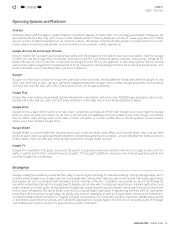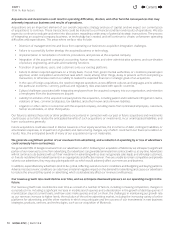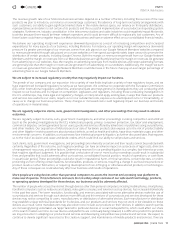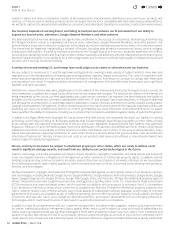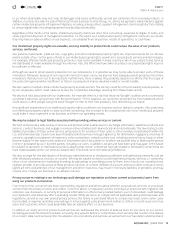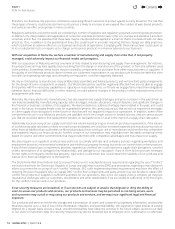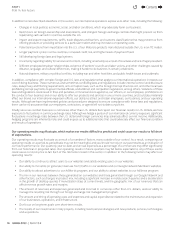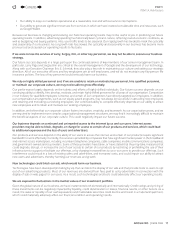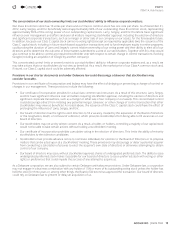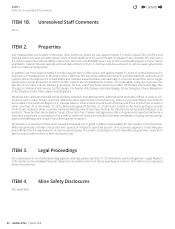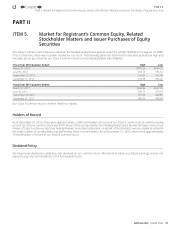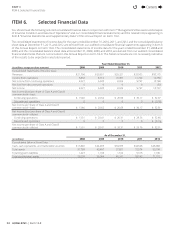Google 2012 Annual Report Download - page 21
Download and view the complete annual report
Please find page 21 of the 2012 Google annual report below. You can navigate through the pages in the report by either clicking on the pages listed below, or by using the keyword search tool below to find specific information within the annual report.
15GOOGLE INC. | Form10-K
PART I
ITEM1A.Risk Factors
Additionally, outside parties may attempt to fraudulently induce employees, users, or customers to disclose sensitive information in
order to gain access to our data or our users’ or customers’ data. Any such breach or unauthorized access could result in signifi cant
legal and fi nancial exposure, damage to our reputation, and a loss of confi dence in the security of our products and services that
could potentially have an adverse eff ect on our business. Because the techniques used to obtain unauthorized access, disable or
degrade service, or sabotage systems change frequently and often are not recognized until launched against a target, we may be
unable to anticipate these techniques or to implement adequate preventative measures. If an actual or perceived breach of our
security occurs, the market perception of the eff ectiveness of our security measures could be harmed and we could lose users and
customers.
Web spam and content farms could decrease our search quality, which could damage our reputation and deter our
current and potential users from using our products and services.
“Web spam” refers to websites that attempt to violate a search engine’s quality guidelines or that otherwise seek to rank higher
in search results than a search engine’s assessment of their relevance and utility would rank them. Although English-language
web spam in our search results has been signifi cantly reduced, and web spam in most other languages is limited, we expect web
spammers will continue to seek ways to improve their rankings inappropriately. We continuously combat web spam, including through
indexing technology that makes it harder for spam-like, less useful web content to rank highly. We face challenges from low-quality
and irrelevant content websites, including “content farms,” which are websites that generate large quantities of low-quality content
to help them improve their search rankings. We are continually launching algorithmic changes focused on low-quality websites. If
web spam and content farms continue to increase on Google, this could hurt our reputation for delivering relevant information or
reduce user tra c to our websites. In addition, as we continue to take actions to improve our search quality and reduce low-quality
content, this may in the short run reduce our AdSense revenues, since some of these websites are AdSense partners.
Interruption or failure of our information technology and communications systems could hurt our ability to eff ectively
provide our products and services, which could damage our reputation and harm our operating results.
The availability of our products and services depends on the continuing operation of our information technology and communications
systems. Our systems are vulnerable to damage or interruption from earthquakes, terrorist attacks, fl oods, fi res, power loss,
telecommunications failures, computer viruses, computer denial of service attacks, or other attempts to harm our systems. Some of
our data centers are located in areas with a high risk of major earthquakes. Our data centers are also subject to break-ins, sabotage,
and intentional acts of vandalism, and to potential disruptions if the operators of these facilities have fi nancial di culties. Some of our
systems are not fully redundant, and our disaster recovery planning cannot account for all eventualities. The occurrence of a natural
disaster, a decision to close a facility we are using without adequate notice for fi nancial reasons, or other unanticipated problems at
our data centers could result in lengthy interruptions in our service. In addition, our products and services are highly technical and
complex and may contain errors or vulnerabilities. Any errors or vulnerabilities in our products and services, or damage to or failure
of our systems, could result in interruptions in our services, which could reduce our revenues and profi ts, and damage our brand.
Our international operations expose us to additional risks that could harm our business, operating results, and fi nancial
condition.
Our international operations are signifi cant to our revenues and net income, and we plan to further expand internationally.
International revenues accounted for approximately 53% of our consolidated revenues in 2012, and more than half of our user
tra c has been coming from outside the U.S. In certain international markets, we have limited operating experience and may not
benefi t from any fi rst-to-market advantages or otherwise succeed.
Our Motorola business also has facilities outside the U.S., and nearly all of our Motorola products (other than some prototypes) are
manufactured outside the U.S., primarily in China, Taiwan and Brazil.If our manufacturing in these countries is disrupted, our overall
capacity could be reduced and sales or profi tability could be negatively impacted. We require these suppliers and business partners
to comply with law and company policies regarding workplace and employment practices, environmental compliance and intellectual
property licensing, but we do not control them or their practices. If any of them violates laws or implements practices regarded
as unethical, we could experience supply chain disruptions, canceled orders, terminations of or damage to key relationships, and
damage to our reputation. If any of them fails to procure necessary license rights to third-party intellectual property, legal action
could ensue that could impact the salability of our products and expose us to fi nancial obligations to third parties.
Moreover, in connectionwith our operations in Brazil, we have had and continue to have legal disputes andcontroversies, including
tax, labor and trade compliance controversies and other legal mattersthat take many years to resolve. We incur legal and other costsin
managing and defending these matters and expect to continue to incur such costs. Based on our assessment ofthesematters, we
have recorded reserves on only a small portion of the total potential exposure. Itis, however, very di cult to predict the outcome of
legal disputes and controversies, including litigation, in Brazil and our ultimate exposure may be greater than our current assessments
and related reserves.
4
Contents
4


